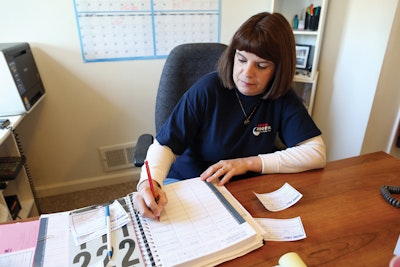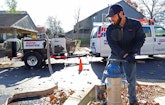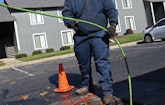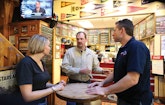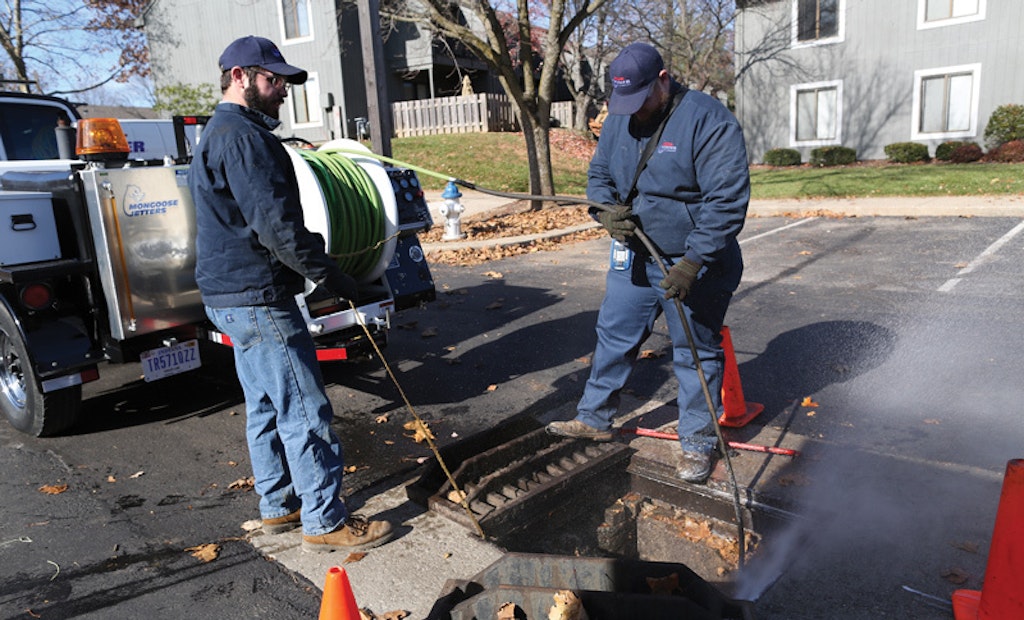
Interested in Cleaning?
Get Cleaning articles, news and videos right in your inbox! Sign up now.
Cleaning + Get AlertsIn 2003, Robert Christman purchased the Roto-Rooter franchise in Bloomington, Ind. In the first two years he went from an IBM electric typewriter to computers and accounting software and tripled his staff from two to six employees. Christman says he had faith the business would take off, but then the economy sagged and he began to struggle.
Fast-forward to November 2013. The franchise, which had grown to eight employees, celebrated its 10-year anniversary with its most successful year ever. Finally, there was a bright light at the end of the tunnel.
The early years
Before purchasing the Bloomington franchise, Christman had worked for Roto-Rooter Services in Indianapolis as a general manager. He was also a licensed plumber, so he was well-qualified to run a cleaning business. When the Bloomington franchise came up for sale, Roto-Rooter Services had an opportunity to acquire it as a satellite operation. When they declined, Christman and his wife, Polly, bought the company.
“The previous owners were ready to retire,” Christman says. “They had been successful over the years, but the business had suffered in the later times. You have to adapt and change, and we came in with a fresh set of eyes – fresh blood, if you will. We needed to bring in new services in addition to drain cleaning. We needed to expand the commercial end of the business. We have been able to see our percentages grow to 60 percent residential and 40 percent commercial. If I were to speculate, I would say the previous owner was doing about 90 percent residential and the balance in commercial. To equalize that equation we had to do something. Marketing was the first priority,” he says.
Christman embarked on a personal campaign to let people know about Roto-Rooter. He didn’t just call on restaurants and potential customers. Instead, he took his family out to restaurants and he would make a point of speaking with the manager – commenting on their food service, asking for their business. Very often the response was “I don’t really know why we don’t call Roto-Rooter, but we will consider doing so in the future.”
He found other ways of personally speaking with potential customers by using their services and offering his own. He joined organizations and introduced himself and his company. He wanted to know why people were not calling his business. He discovered that many didn’t realize Roto-Rooter pumped small grease traps. As he made these efforts, he could see that “light bulbs were going off. People began to realize that we had something to offer.”
With the economy in a free fall so early on, this commercial business was essential in keeping the doors open.
“Commercial business is more recession-proof because to keep a business going they have to take care of problems in emergency situations. A homeowner might be able to put something off. A restaurant cannot,” Christman says. “We were reminding these potential customers that we are a 24/7 operation, that our doors are open for them. We started bringing in that revenue.”
Campgrounds, which are abundant in the area, became a valuable new source of business because they need maintenance and must be kept operational.
“When they have lift stations that are down, [the campgrounds] cannot function. They need working showers and facilities. This has become an important portion of our commercial business. Many of the people using these facilities also live in the area, and when they see the Roto-Rooter truck, it becomes another advertising tool for us.”
Christman’s residential customer base was solid, but it tended to be an older generation, and he needed to reach younger homeowners. So, he immediately hit the radio waves and prepared fliers.
“We had to establish ourselves if we were going to continue. First target was commercial and then the residential customer,” he says.
As the recession progressed, Christman was able to hang on thanks in part to relationships he had established earlier, which included not only customers, but his banker.
“We were a small business in our community,” Christman says. “They knew we needed a line of credit. They did not want to see a small business fail. They wanted to work with us and not against us. It is important to be proactive when things get rough.”
Google it
During the recession, Christman noticed interesting changes in residential work.
“People became more cost conscious, but at the same time, they didn’t always want to just do a spot repair,” he says. “They want to do what is best for their home. They don’t want a short fix where we would be back in six months. With the economy turning they are telling us to fix the line permanently in the way we are suggesting. They are saying ‘This will make things better for me.’ They are seeing that this is money well spent.”
Internet searches have also created a new type of customer. Customers who call Roto-Rooter say, “I think I have this problem. Do you have this particular camera I’ve seen online? I’m going to have you come out and run the clean-out, I think the problem is about 30 feet out.”
“Ten years ago, people were amazed you could put a camera in the sewer. Now they know about it in advance,” Christman says. “In some ways this is good, but in some ways not so great. They don’t always have the solution quite right. We are also finding that it’s not just the younger people being savvy. We can have an older fellow telling us he just Googled to find out what his problem is.”
By the same process, consumers can make or break a company with a good or bad review. Christman says this has made professionalism in the industry a must.
“You have to be ready – be prepared for whatever,” he says. “Look people in the eye and be honest because it is much more important to do the right thing. If you don’t, you will be the one who gets the negative review.”
Game changers
Christman says that adding the camera in 2004 was the biggest game changer for his business.
“When you can show proof to the homeowner right there on the spot – here is the problem – they can see it for themselves. It is real and not just your opinion. That technology is irreplaceable. You need to have a camera available. That was one of the smartest things we did, and I give credit to my wife, Polly, who was with me at the Pumper & Cleaner [Environmental Expo International]. She was amazed and insisted I have that camera.”
They have two Spartan mini-cam pushrod cameras.
Christman’s policy is to charge an additional amount for the camera. However, technicians are authorized to make an exception for putting the camera in the line when the extra fee creates a hardship for the customer. Technicians then call the office and get authorization to reduce or eliminate the charge.
In 2012, Christman purchased a Mongoose 184 trailer jetter from Sewer Equipment Co. of America, which was an important step. Before residential jetting service took off, they began getting calls from competitors who needed help.
“These were our competitors – our adversaries,” he says. “I would think, ‘Why don’t I have this job? I don’t want to help this guy.’ But then we had a gut check. We decided to get over it. If they call for help, let’s go help. They were sold on what we could do for them. They thought it was fantastic, and said they would call whenever they needed our jetter. Now we have more people calling us, and we keep the jetter busy with our own clients and those of our competitors. We are heroes to their customers when we show up and take care of a problem that looked impossible. Our competitors are providing a service. We are the experts because we made that investment and became a resource.
“We show up in our Roto-Rooter truck. We are not there to steal a customer, but to do the job. It’s a win-win for everyone. Our jetter is out constantly. It does the job the cable machine cannot do. It means lower overhead for all, and it is trickle-down profitability.”
In a short time, the jetter was being used equally for residential and commercial accounts. With residential, the jetter opens lines the cable can’t handle. With commercial accounts, when an entire apartment complex is backed up and three manholes are standing full, the jetter is the tool of choice.
Christman continued his equipment upgrades with a new backhoe, so he can handle excavation when a line needs to be replaced or repaired. Typically the lateral lines are less than 100 feet – most often about 50 feet long. Adding relining or pipe bursting is something Christman says he will consider later.
“In our area, there is a lot of clay and cast iron, and we also have to deal with Orangeburg pipe, which often has to be repaired or replaced.”
Their fleet includes a 2002 Ford van and five Chevrolet Express 3/4-ton vans.
Customer first
Early on, Christman realized he had a turnover problem with personnel.
“After we settled down, I saw that I would need to be sure and get the right people onboard,” he says. “My theory was that the customer had to be No. 1 and the company No. 2 in importance. I believed that if we take care of that customer, and get our technicians to follow that philosophy, it would mean we were working toward the same goals. But I needed to have the right people. It also meant having people who would care for and take care of the equipment in their charge.”
It’s not unusual for Christman to call a candidate back two or three times before making a decision.
“We are lucky in our area, which is rural in many regions,” he says. “We have rural and blue-collar folks. Often when we sit down to talk with a candidate, he might say he has been working on his grandfather’s farm putting up hay. You can tell when someone is ready to roll up his sleeves and go to work. It is easy for us to find hard-working people.
“We are a small company, and so we are like a family. I also depend on my production manager, John Farmer, and his wife, Debbie, who is our office manager, to weigh in on candidates during the interview process. Debbie has an excellent sense in judging an individual.”
Technicians in the field are assigned their own service vehicle and are responsible for the equipment onboard, valued at about $10,000. They can choose to drive back and forth from work or to leave their truck at the yard in Bloomington unless on call. The business is located on a 1/2-acre lot in the city, which includes a shop and room for vehicles.
“Plumbing is expensive,” Christman says. “Drain cleaning is expensive. It is too hard to earn money these days, and then to have to give it to someone who has given substandard service, or to someone who does not share in a common goal. We want to be that provider who offers to all our customers – residential or commercial – the highest quality product available in the market today.”
